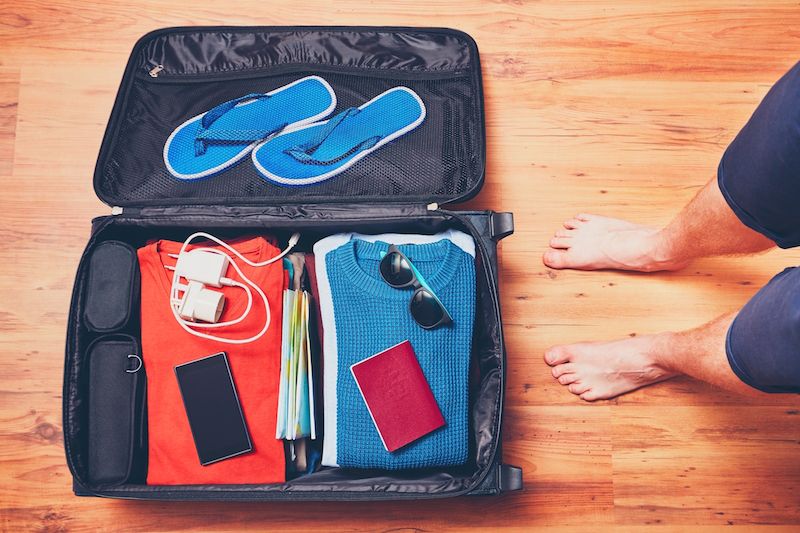As summer approaches and people head off to favorite destination spots, you may wonder if you can pack a bag and join them. There may be times you won’t be able to travel — and times you won’t want to. If you’re willing and able to take off, you’ll need two things to have a safe, enjoyable trip: the OK from your physician and some thoughtful planning.
The Basics
Give your Roswell Park oncology team the details of your travel plans. If your physician says it’s OK to go, ask for advice on safe locations (given your current health), ways to make traveling less stressful, and how to stay safe and minimize the risk of illness.
Consider your destination. Do you need special vaccinations, and does your oncologist say it’s safe for you to get them?
Tell your health insurance provider where you are going and ask where to go and whom to see if you have an urgent or emergency medical issue while you are away.
Travel with someone who knows you, understands your condition and can help you when needed. Discuss schedules and types of activities that would be best for you.
Schedule a follow-up appointment with your physician for when you return.
Never miss another Cancer Talk blog!
Sign up to receive our monthly Cancer Talk e-newsletter.
Sign up!Wheels Up (Air Travel)
Call your airline and arrange for a wheelchair to take you from the curb to your gate, from gate to gate (if connecting), and from gate to curb at your destination. Wheelchairs can be useful if you find it difficult to walk or stand for more than a few minutes; if you are fatigued, nauseous or dizzy; or if you are at high risk of falling. Also tell the airline if you will need oxygen during the flight or a layover.
Pack your own snack. Bring foods that are portable and low in salt and sugar.
Pack all medications and equipment in your carry-on. You are allowed to have liquid medications above the usual limit.
Notify the TSA agent before you are screened if you have an IV port, ostomy, head covering or prosthetic. A pat search may be required in place of scanning devices. Check the TSA website for current screening rules for travelers with disabilities and medical conditions to see how they may apply to you.
During the flight, drink lots of water and stay away from alcohol. (It contributes to dehydration).
You may be more susceptible to developing blood clots at high altitudes. Walk around the cabin at least once an hour if you’re able. Ask your doctor if there are any other precautions to take for air travel or if you are staying in a high-altitude location.
By Land or by Sea (Traveling by Train, Car or Cruise Ship)
Trains and cars: For shorter trips, train or car travel can be relaxing and fun. Benefits include more legroom, more flexibility (for food, bathroom and stretching needs) and perhaps more space.
Cruises: Depending on where you are in your treatment process, taking a cruise can be challenging. Contact the staff and the cruise physician on duty and make them aware of your condition before your trip. If your immune system is compromised, underwater adventures may not be suitable for you. Book your excursions well in advance — and don’t venture too far from the ship.
During Your Getaway
Keep drinking, especially during travel and when the environment is dry.
Drink bottled water. If you are in an area known for traveler’s diarrhea (loose stools and abdominal pain), remember to use bottled water to brush your teeth, rinse foods, etc.
Eat cooked foods only. (No raw fruit, vegetables, fish, meat, etc.)
Protect your skin from the sun. Sunscreen should have an SPF of 15+. Some medications make you extremely sensitive to sunlight, and you may be advised to use SPF 30+ and keep your skin covered (hats, long sleeves and long pants), even when the sky is cloudy.
Get plenty of rest and don’t push yourself beyond your limits.
Seek care immediately if you have unusual or persistent symptoms.
Relax and enjoy yourself!
Keep these items with you all the time:
Identification. For international travel, you need a passport. For domestic travel, you need a driver’s license or a state-issued non-driver ID card.
Proof that you have health insurance, such as an ID card.
A summary from your doctor, on letterhead, that lists your diagnosis, allergies, medications, treatment plan, special instructions and your healthcare provider’s emergency contact numbers. (Or use a mobile app, such as Cancer.Net Mobile, to track your medical history.)
A list of all your medications, dosages and times. If you are traveling across time zones, ask your doctor for a schedule of when to take each medication. Bring written prescriptions for medications you must take every day.
A list of local medical emergency contacts — doctors, hospitals, etc. — at your vacation destination.


